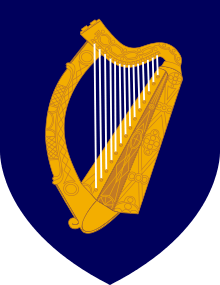Department of state (Ireland)
 |
| This article is part of a series on the politics and government of the Republic of Ireland |
|
Judiciary |
|
Divisions |
|
Politics portal |
A department of state (Irish: Roinn Stáit) of Ireland is a department or ministry of the Government of Ireland. The head of such a department is called a Minister of the Government; prior to 1977 such ministers were called Ministers of State, a term now used for junior (non-cabinet) ministers.[1] Most members of the government are Ministers of the Government, though there may occasionally be a minister without portfolio. The law regarding the departments of state and ministers of the government is detailed in the Ministers and Secretaries Act 1924 and amendments. The Constitution of Ireland also has significant legal effect on functions and structures.
Overview
There are sixteen individual departments of state in the Irish Government. Each department is led by a Minister of the Government, who is appointed by the President on the nomination of the Taoiseach and approval of Dáil Éireann, and cover matters that require direct political oversight. For all departments, the Minister in question is simply known as Minister for... and is a member of the Cabinet, a cabinet-level minister without a department is called a minister without portfolio but currently there is none of such standing. A Minister of the Government is generally supported by a team of junior ministers, officially called Ministers of State, and may delegate powers to such officials in accordance with law.
Under the terms of the Constitution, there may be no fewer than seven, and no more than fifteen members of the cabinet, though there is no restriction on individual Ministers being responsible for more than one department (this is the case at present where Alan Shatter is responsible for both the Department of Justice and Equality and the Department of Defence; and where in the final days of the Government of the 30th Dáil some Ministers were responsible for as many as three departments).
The Minister of the Government has the power to suggest and propose new or amended legislation to the Government relating to matters that arise in his or her own department. Ministers are also entitled to make "statutory instruments", also known as delegated or secondary legislation. Statutory instruments allow the minister to give effect to or implement legislation without the need to have every detail passed by the Oireachtas. Statutory instruments do not have to be approved by the Oireachtas, although they may be cancelled by either the Dáil or the Seanad.
Each department of state has a permanent staff that remains in office regardless of changes in government or the Oireachtas. The departments' staff are described as the civil service. The administrative management of the department is led by a senior civil servant known as a secretary-general. These officials advise and assist the minister in the running of the department.
List of departments of state
Current departments of state, listed under their present title.
Past Departments of state, listed under their final title.
References
Notes
External links
- Alphabetical list of orders made under section 6 (1) of the Ministers and Secretaries (Amendment) Act, 1939 (change of name and transfer of functions between Departments of State)